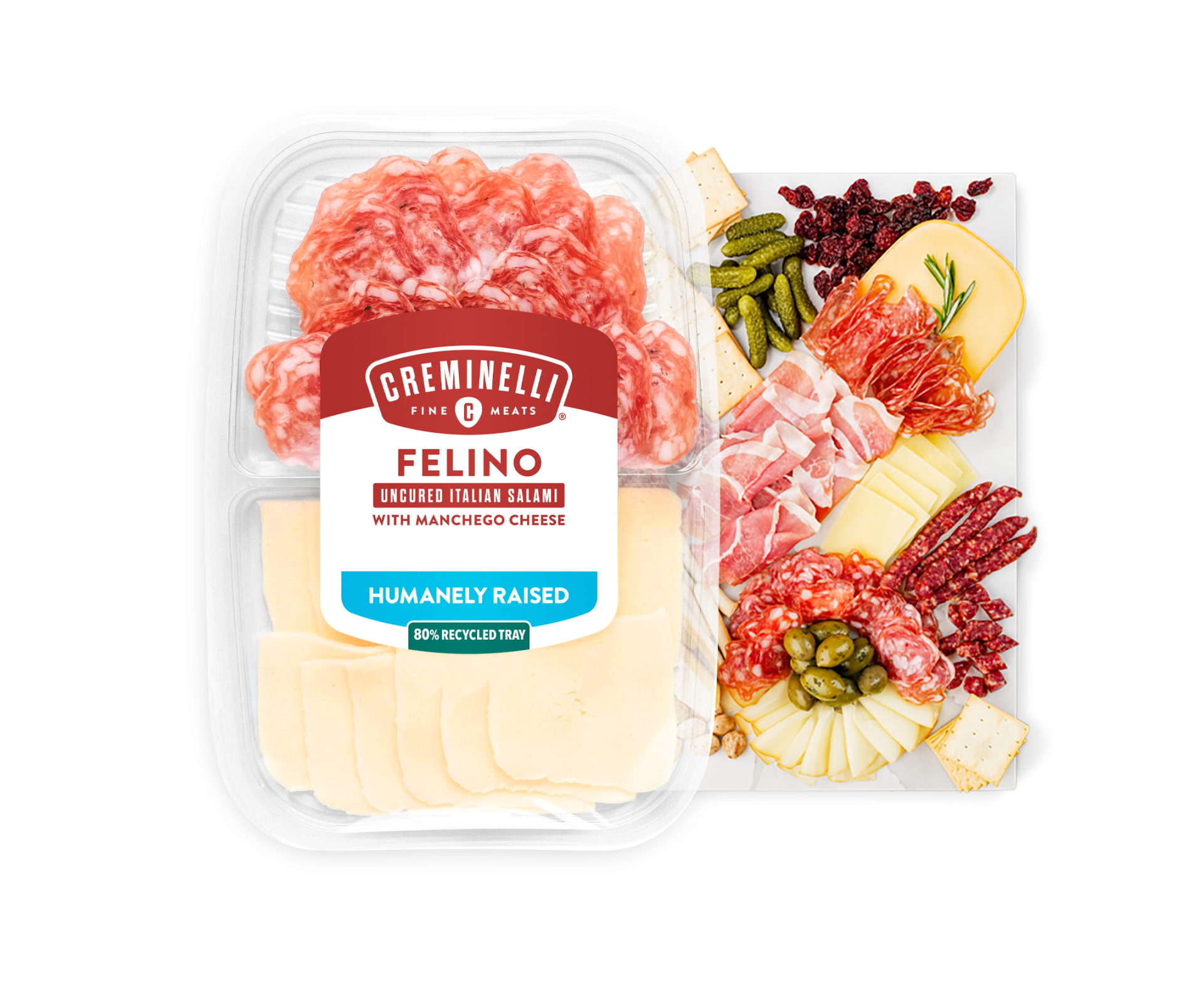One can taste the flavors in Creminelli artisan meats, cheeses, and protein-rich snacks. Cultivated for hundreds of years, the Creminelli family has passed down the tradition of crafting artisan salami and charcuterie in Italy. Today, Americans can enjoy rich, traditional, and delicious charcuterie products thanks to a worldwide event.
The story of launching the Creminelli brand in the United States actually began during the 2006 Winter Olympics (XX Olympic Winter Games) being held in Italy. Chris Bowler, the CEO of Charcuterie Artisans, the parent company of Creminelli, was working at the Olympics to source products for the America House, where the American Olympic athletes stayed during the games. He would meet Master Artisan Cristiano Creminelli, one of the co-founders of Cremineli, who always had an interest in coming to the U.S. and starting a business. Bowler, Cristiano Creminelli, and a third partner, Jared Lynch, would move to Salt Lake City to develop Creminelli for the U.S. market.
“The idea was to introduce American consumers to really authentic, high-quality, European-style charcuterie,” explains Eric Schwartz, CMO of Creminelli. “Charcuterie has become very popular in the U.S. over the past 10 to 15 years. Before 2007, most Americans did not know what it was, and the three partners saw the opportunity.”
There is a parallel between the story of Creminelli and a very popular coffee brand. The founder of the coffee brand wanted to introduce Americans to the European-style hot coffee experience, and that brand exploded in popularity in the U.S. market. The partners of Creminelli had the same explosive growth offering incredible artisan European-inspired food products to Americans.
The company is based in Utah since the climate is similar to Biella, Italy, the home of Cristiano Creminelli. The geography is comparable with both places located in a valley surrounded by mountains. With the manufacture, aging, and drying of charcuterie, temperature and humidity are critical factors in the process.
“The air is arid where we are based, so we can use the natural environment in our aging rooms, cutting down on the energy used by air compressors and other machines,” says Schwartz. “We can use the natural air to help control our environment in our aging rooms.”
The core of its business is charcuterie snack packs. Think of a lunch pack sold but for adults. According to Schwartz, their two-ounce prosciutto is the best-selling prosciutto product in the U.S. Other choices include meat-only snack packs, including pepperoni, varzi, and calabrese. Additional packs include meat and cheeses such as prosciutto and mozzarella. Another top seller is the three-chamber snack pack that consists of a Sopressata salami, Monterey Jack Cheese, and Sea Salt & Olive Oil crackers.
“What has really driven our business growth is offering truly artisan quality meat in an accessible, familiar, and convenient format for American consumers. This creates the charcuterie board level of quality experience as a fun snack for the market,” says Schwartz.
The other product lines include one of the company’s first products, artisan salami, including the 5½-ounce chub salami that ages four to six weeks in the aging room. Creminelli uses a low-temperature fermentation process. The time to prepare salami using this process takes longer, but Creminelli continues to use this traditional method for the high-quality finished products it produces. This method allows the flavor and texture to develop more, and the mold that forms during the process draws out more acidity. The final product is sweeter with less acidity so consumers can appreciate the more nuanced flavors. While this product line remains smaller, it fills a niche culinary market with a salami that still has the mold and casing. A more sophisticated consumer enjoys the hands-on process of opening up the salami, scoring it, and peeling the casing back. The Artisan Deli line is very similar, offering larger format pieces in a behind-the-counter sourced-order deli.
Creminelli’s newest product line is Salami Minis, a meat stick snack launched in 2019 using traditional curing methods rather than smoking or cooking. The meat is aged for a week since they are smaller in diameter, but the same fermentation, aging, and drying process is still used. These salami minis are shelf-stable and can be marketed as an on-the-go snack for camping, skiing, or a snack in the workplace. The product features 19 grams of protein and 0 grams of sugar per pack.
Using the highest standards available, Creminelli partners with a supplier with a network of family-owned and operated farms across the country, especially in the mid-west.
“The pork we use is 100 percent humanly raised,” says Schwartz. “Our suppliers have to meet stringent standards regarding how the animals are raised, including being given no antibiotics, fed a vegetarian diet, and having access to open living conditions. We seek the pinnacle of animal husbandry practices in the U.S.”
Schwartz has had the opportunity to visit and meet the families that operate the farms, and it has been gratifying for him.
“One of the aspects of this program is that these family farms often struggle to compete against large factory farms in a commodity market, but they [family farms] don’t have the economy to scale. But by raising animals in a humanely raised program, they can charge a premium for their pigs and not compete directly against those larger producers. This has enabled families to retain ownership of the farm and keep it in the family,” Schwartz says. “We are thrilled to be part of this system, and the quality of our meats is reflected in how the pigs are raised.”
Working with an extensive range of suppliers, Creminelli imports gouda from Holland and sources high-quality cheeses from the U.S. The essential characteristic is that all cheeses use all use rBST-free milk. Other factors are finding tastes, textures, and color (provolone, mozzarella, and Monterey Jack) that will pair very well with salamis and other meat products.
As for sustainability, a new program was implemented in March, shipping the entire brand of snack packs in trays that are made of 80 percent post-consumer recycled content. About 11 million trays containing the Creminelli brand snack packs are sold annually, and that transitions to about 11 million water bottles repurposed instead of ending up in the ocean.
“Sustainability is an important value for Creminelli and important to our consumers.”
As a brand, Creminelli skews to a younger demographic, with a big following among millennials. Along with flavor and convenience, this is another factor that influences millennials when they purchase any product, as well as the relationship they build with brands.
Addressing the use of single-use plastics in the tray lineup, Creminelli wants to utilize the highest amount of post-consumer recycled content that is possible to achieve while preserving product quality. They were able to reach 80 percent post-consumer content and maintain shelf life, placing them in the leadership position for sustainability for packaged goods.
They also use a corrugate supplier who plants the equivalent of 1.5 trees for every tree they use for processing and producing the corrugate, which extends from its primary packaging to its second packaging.
“We will continue to strive to be at the forefront to implement sustainable business practices as we produce our products,” he says.
As a company of foodies for foodies, Creminelli also gives back to the community. Their core consumers new foods and share them with others. Its philanthropic efforts are aligned in that direction. Since the company is based in Salt Lake City, they have partnered with The Spice Kitchen or Spice Kitchen Incubator (spicekitchenincubator.org). The International Rescue Committee (IRC) project helps refugees and other disadvantaged community members interested in starting a full or part-time food business. Spice Kitchen Incubator assists participants in receiving technical assistance and training, having affordable access to commercial kitchen space, and learning the steps to establishing a successful food business such as catering, food truck, or a restaurant.
Creminelli is distributed nationally at Whole Foods, Publix, Target, and other natural and gourmet grocery stores such as Harmons Neighborhood Grocer in Utah. They are available in Costco in the northern region of California. “Our product formats are really resonating across many retail formats such as Target in mass retail, grocery stores, club stores, and other niche markets.”
The company started with humble beginnings in the basement of a gourmet grocery store, Tony Caputo’s, in Salt Lake City. Cristiano Creminelli would age his salami in refrigerator-size batches in the basement and even slept in the basement so he could check on the progress of his meat. After some big breaks, the business exploded, especially with the introduction of the snack pack, and today the company is capturing the U.S. market.
Visit creminelli.com for more info and follow on Facebook @ Creminelli and Instagram @ creminelli.







